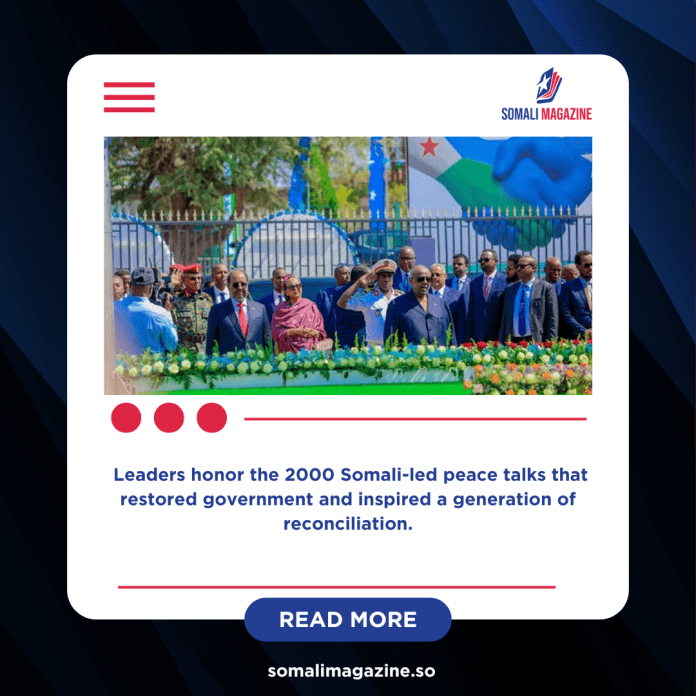Facebook Twitter (X) Instagram Somali Magazine - People's Magazine
Somali President Hassan Sheikh Mohamud and Djiboutian President Ismaïl Omar Guelleh on Thursday laid a wreath in Arta to mark the 25th anniversary of the historic peace conference that restored Somalia’s government after nearly a decade of civil war and collapse. The event, attended by former Somali leaders, presidential hopefuls, and regional diplomats, celebrated the 2000 Arta Peace Conference — a turning point that helped revive Somali statehood and laid the foundation for rebuilding the nation.
President Guelleh described the 2000 Arta talks as a “historic milestone” that reflected Djibouti’s unwavering support for Somalia’s peace and unity. He said the spirit of Arta continues to symbolize hope, collaboration, and Somali ownership in the pursuit of reconciliation. Guelleh reaffirmed Djibouti’s role as a loyal partner in the Horn of Africa’s stability efforts, emphasizing that peace in the region can only be achieved through dialogue and cooperation.
President Hassan Sheikh Mohamud expressed gratitude to Djibouti for standing with Somalia during its most difficult years. He praised the neighboring country’s consistent partnership and called on regional governments to strengthen ties and safeguard the region’s fragile peace. Djibouti’s foreign minister echoed those sentiments, noting that Somalia’s current peace and state-building efforts are still guided by the same principles of inclusivity and Somali leadership that shaped the Arta process 25 years ago.
The Arta Peace Conference, held in May 2000, came after years of failed reconciliation efforts in Ethiopia, Egypt, and Kenya. Unlike previous attempts dominated by warlords and political elites, the Djibouti-led initiative took a more inclusive approach. It brought together over 2,000 delegates representing clan elders, women, intellectuals, religious leaders, and members of the Somali diaspora. With the support of the Intergovernmental Authority on Development (IGAD) and the Organization of African Unity (OAU), the conference became the most comprehensive Somali-led peace effort of its time.
A key outcome of the conference was the adoption of the 4.5 clan power-sharing formula, which gave equal representation to the four major clans—Darod, Dir, Hawiye, and Rahanweyn—and a half share to minority groups. Women’s groups, collectively known as the “Sixth Clan,” also gained official representation in the national peace process for the first time. This inclusivity marked a major shift toward a broader and fairer political dialogue among Somalis.
After four months of negotiations, delegates adopted the Transitional National Charter, which paved the way for the establishment of the Transitional National Government (TNG). On August 26, 2000, Abdiqasim Salad Hassan was elected as Somalia’s first president since the fall of the central government in 1991. The TNG, based in Mogadishu, received recognition from the United Nations, the Arab League, and the African Union, restoring Somalia’s international legitimacy. The UN Security Council described the Arta process as the most promising foundation for peace and reconciliation in Somalia.
Although the TNG faced challenges and was short-lived, its creation marked the beginning of a new political era. The Arta framework later influenced key milestones, including the 2004 Nairobi Conference that formed the Transitional Federal Government and the 2012 adoption of the Provisional Federal Constitution, which still guides Somalia today.
At the 25th anniversary ceremony, President Guelleh reflected on the enduring impact of the Arta spirit. “The vision of Arta lives on,” he said. “It reminds us that peace in Somalia and across our region must always be built through dialogue, not division.” His words captured the essence of what Arta represented — a moment of hope, unity, and Somali-driven reconciliation that continues to shape the nation’s path toward lasting peace.

